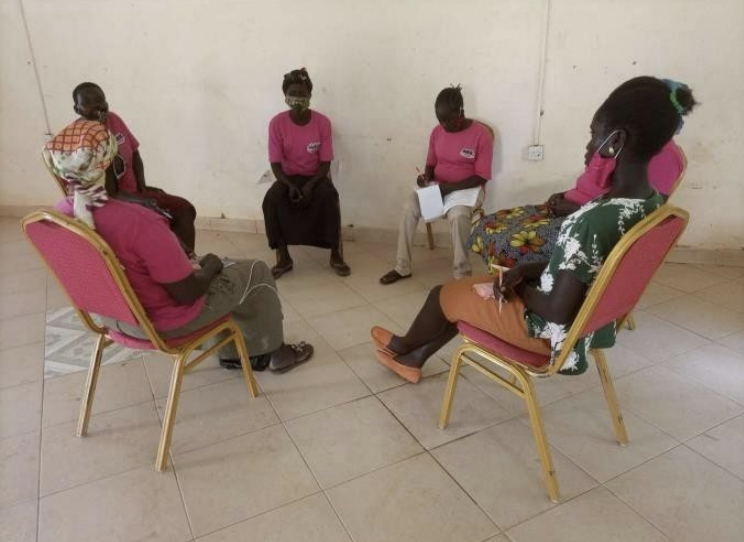From Fear and Harassment to Courage and Success: Women-Led Civilian Protection in Lui

Since the occupation of Lui town by armed actors in 2016, local communities were pestered by violent acts of the army inflicted on the civilian population. In the area, armed actors have been accused of arbitrary arrests of youths, false accusations, beating civilians who were suspected to work with non-state actors, and robberies within Lui town and along the Lui-Jabo roads. As part of Nonviolent Peaceforce’s (NP) work in the region, NP focused on the establishment and capacity building of the Women’s Protection Team (WPT). With the objective of improving the general security and protection situation around Lui town, the WPT also concentrates on advocacy efforts. For example, raising concerns of the local community, specifically women’s issues, to humanitarian partners, to armed forces, and local authorities. In addition, WPT members monitor the activity of armed actors that violate the ceasefire agreement and report breaches to NP for further suitable action. After continued interactions with the WPTs, its members are confident in their roles and have made significant contributions to the safety and security in Lui town and surroundings.
Building the Women’s Protection Teams
When the Lui WPT was first formed in 2017, its members faced challenges in conducting activities and advocacy efforts. The women feared accusations of spying and repercussions when reporting on unlawful military operations and misbehavior. Other challenges were related to confidence building regarding the role that women may have within communities when it comes to protection and safety. NP continued to work with the WPTs, connecting them to other women’s groups such as Mothers Union, an organization of women who were already performing peacebuilding activities in their church. Trainings were provided on Unarmed Civilian Protection (UCP) which includes topics such as: peacebuilding, conflict management, gender relations, gender-based violence (GBV), early warning early response (EWER), social cohesion, protection, the ceasefire agreement ,and civilian ceasefire monitoring and reporting mechanisms. The trainings have not only empowered the members of the WPT to protect others, but have also provided them with the skills to use nonviolent communication to protect themselves, their families, and their properties and have made them feel more confident in conversations with military forces
“The trainings we received from NP have enabled us to be confident enough to speak to [the armed group] when we are faced with difficult situation. One-time, a group of [soldiers] came to my home demanding for a chicken, but because of the nonviolent approaches I had learnt from NP, I tried to negotiate with them in a non-violent way until we reached a common understanding, and I willingly served them with ready cooked food instead of my chicken.” (Lui, March 2021)
Successful engagements by the WPTs in Lui
Having been empowered by the various trainings, the WPTs in and around Lui started to get more confident in their role as a community-based protection mechanism (CBPM), and showed the intent to continue the WPT’s work beyond the project’s funding period. The WPT already engaged in multiple successful activities, which help to reduce the impact of violent conflict on the community.
For example, during the second week of March 2021, the WPT in Lui-Mundri East County, successfully advocated for the release of two young civilians detained by an armed group. The two youngsters had been arrested, beaten and detained at a military barrack in Lui, due to allegations of being non-state actors by the armed group. Both young males were released a few days after the group negotiated with the armed group. Members of the WPT have further committed themselves to proactively engage between members of their community and other communities when disputes emerge. One WPT member noted:
“I solved a conflict between two women at a borehole in Lui. One of the women in dispute was from our own community and the other woman was a caretaker to a patient at the Lui hospital. The woman from our community refused to let the caretaker to fetch water because she was a stranger. I educated the two to understand that regardless of whether they come from different communities, both of them are human beings with equal dignity that should be equally respected and they equally need water to live. I then talked to the woman from my area to allow the caretaker to fetch water first because she might want to serve the life of the patient with water/food and attend to other needs of the patient. The woman from my community thanked me for my advice and allowed the caretaker to fetch water first. From that time on, she has always been friendly to strangers who go to fetch water from the same borehole.” (Lui, 24 April 2021)
Continuing the work of the WPTs
The WPT in Lui will continue to provide accompaniment for GBV survivors, raise awareness on GBV prevention, and negotiate for the release of local youths who are arbitrarily detained by the SSPDF. The WPTs monitor and report ceasefire breaches perpetrated by the signatory parties and identify indicators of violent conflict before escalation, reporting these to NP and other suitable partners. Lastly, members of the WPT have reported that their work has resulted in reduced rates of violence in the region compared to 2017-2018. With this in mind, the WPT is committed to ensuring peaceful coexistence between the army and civilians, and communities and individuals.
NP hopes to engage with other remote communities to further promote safety and security through NP’s Unarmed Civilian Protection (UCP) approach.
